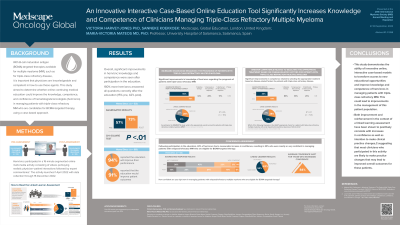Treatment of Relapsed/Refractory Myeloma
Poster Session 2
P-268: AN INNOVATIVE INTERACTIVE CASE-BASED ONLINE EDUCATION TOOL SIGNIFICANTLY INCREASES KNOWLEDGE AND COMPETENCE OF CLINICIANS MANAGING TRIPLE-CLASS REFRACTORY MULTIPLE MYELOMA
Thursday, September 28, 2023
12:30 PM - 1:30 PM EEST


Victoria Harvey-Jones, PhD
Clinical Strategist
WebMD/Medscape Oncology Global, United States
Introduction: With BCMA-targeted therapies available for multiple myeloma (MM), such as for triple-class refractory disease, it is important that physicians are knowledgeable and competent in how to use these agents. This study aimed to determine whether online continuing medical education could improve the knowledge, competence, and confidence of hematologists/oncologists (hem/oncs) in managing patients with triple-class refractory MM who are candidates for BCMA-targeted therapy, using a case-based approach.
Methods: Hem/oncs participated in a 16-minute segmented online multi-media activity consisting of videos portraying realistic physician–patient interactions followed by expert commentaries. Educational effect was assessed using a repeated-pair design with pre-/post-assessment. 3 multiple choice questions assessed knowledge/competence, and 1 question rated on a Likert-type scale assessed confidence. A paired samples t-test was conducted for significance testing on overall average number of correct responses and for confidence rating, and a McNemar’s test was conducted at the question or learning objective level (5% significance level, P <.05). Cohen’s d with correction for paired samples estimated the effect size of the education on number of correct responses ( <.20 modest, .20-.49 small, .59-.79 moderate, ≥.80 large). Data were collected from 01/04/22 to 16/12/22.
Results: Overall, significant improvements in hem/onc knowledge and competence were seen after participation in the education (average correct response rate: 57% pre-assessment vs 73% post-assessment; P<.01, Cohen’s d = 0.46, N=53). 180% more hem/oncs answered all questions correctly after the education (15% pre, 42% post). Specifically, there were significant improvements in knowledge regarding the prognosis of patients with triple-class refractory MM (60% pre-assessment vs 79% post-assessment; P< 0.05), and competence related to selecting the appropriate treatment based on disease-related factors for patients with triple-class refractory disease (34% pre-assessment vs 64% post-assessment; P< 0.01). 42% had a measurable increase in confidence (P < 0.001), resulting in 25% who were mostly or very confident in managing patients with relapsed/refractory MM who are eligible for BCMA-targeted therapy (11% pre-education). Finally, 94% (N=69) reported the education will improve their performance and 91% that it would improve patient outcomes.
Conclusions: This study demonstrates the ability of innovative online, interactive case-based models to transform access to new educational opportunities and improve knowledge and competence of hem/oncs in managing patients with triple class refractory MM. This could lead to improvements in the management of this patient population.
Methods: Hem/oncs participated in a 16-minute segmented online multi-media activity consisting of videos portraying realistic physician–patient interactions followed by expert commentaries. Educational effect was assessed using a repeated-pair design with pre-/post-assessment. 3 multiple choice questions assessed knowledge/competence, and 1 question rated on a Likert-type scale assessed confidence. A paired samples t-test was conducted for significance testing on overall average number of correct responses and for confidence rating, and a McNemar’s test was conducted at the question or learning objective level (5% significance level, P <.05). Cohen’s d with correction for paired samples estimated the effect size of the education on number of correct responses ( <.20 modest, .20-.49 small, .59-.79 moderate, ≥.80 large). Data were collected from 01/04/22 to 16/12/22.
Results: Overall, significant improvements in hem/onc knowledge and competence were seen after participation in the education (average correct response rate: 57% pre-assessment vs 73% post-assessment; P<.01, Cohen’s d = 0.46, N=53). 180% more hem/oncs answered all questions correctly after the education (15% pre, 42% post). Specifically, there were significant improvements in knowledge regarding the prognosis of patients with triple-class refractory MM (60% pre-assessment vs 79% post-assessment; P< 0.05), and competence related to selecting the appropriate treatment based on disease-related factors for patients with triple-class refractory disease (34% pre-assessment vs 64% post-assessment; P< 0.01). 42% had a measurable increase in confidence (P < 0.001), resulting in 25% who were mostly or very confident in managing patients with relapsed/refractory MM who are eligible for BCMA-targeted therapy (11% pre-education). Finally, 94% (N=69) reported the education will improve their performance and 91% that it would improve patient outcomes.
Conclusions: This study demonstrates the ability of innovative online, interactive case-based models to transform access to new educational opportunities and improve knowledge and competence of hem/oncs in managing patients with triple class refractory MM. This could lead to improvements in the management of this patient population.
